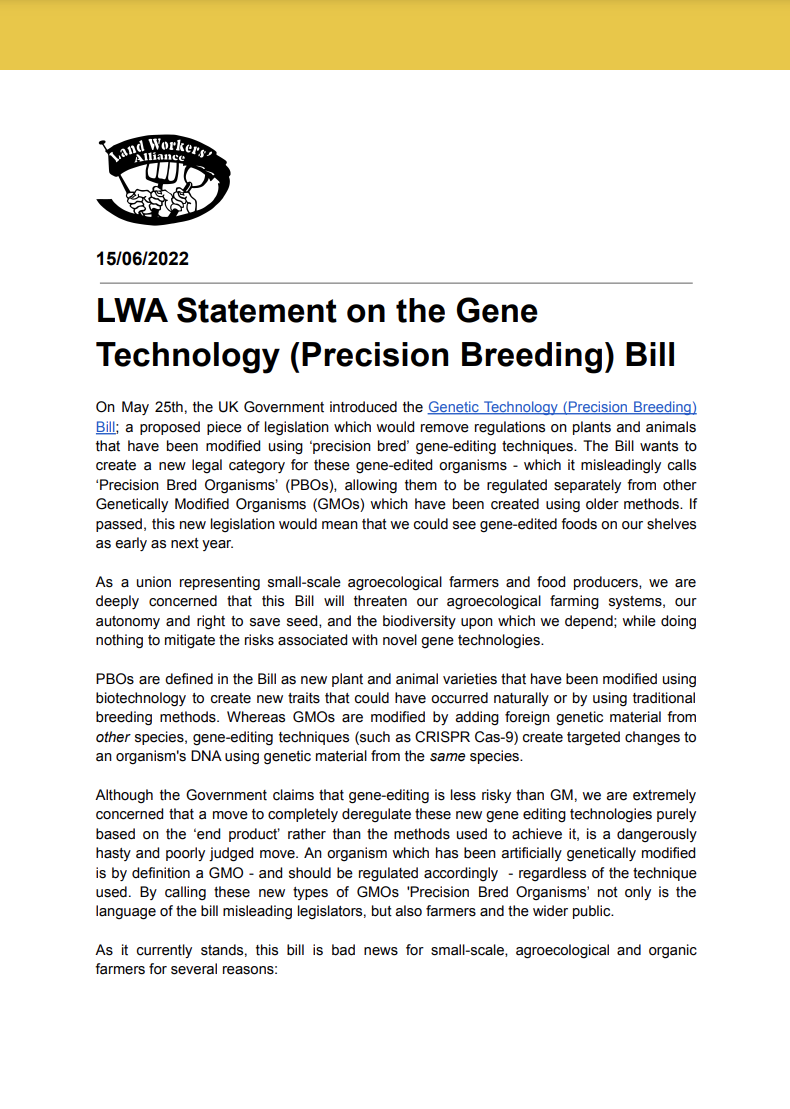On May 25th, the UK Government introduced the Genetic Technology (Precision Breeding) Bill; a proposed piece of legislation which would remove regulations on plants and animals that have been modified using ‘precision bred’ gene-editing techniques. The Bill wants to create a new legal category for these gene-edited organisms – which it misleadingly calls ‘Precision Bred Organisms’ (PBOs), allowing them to be regulated separately from other Genetically Modified Organisms (GMOs) which have been created using older methods. If passed, this new legislation would mean that we could see gene-edited foods on our shelves as early as next year.
As a union representing small-scale agroecological farmers and food producers, we are deeply concerned that this Bill will threaten our agroecological farming systems, our autonomy and right to save seed, and the biodiversity upon which we depend; while doing nothing to mitigate the risks associated with novel gene technologies.
You can read our full statement yma.
We’ve also signed a joint statement with 30 other civil society groups urging MPs to take urgent steps to amend and strengthen safeguarding provisions in the Genetic Technologies (Precision Breeding) Bill.
Jyoti Fernandes, LWA Policy and Campaigns Coordinator said:
“This complicated Bill has ethical, environmental, and regulatory issues that affect farmers and all of us who eat food but the government is ignoring valid concerns in its vainglorious desire to demonstrate its independence from the European Union.
The Government is ignoring its own research showing that the vast majority of people want to know if their food has been altered by genetic technology through clear labelling – there is no provision for labelling in this Bill. This Bill erodes farmers’ rights to know whether their seeds and feed have been tampered with, and all of our rights to know how our food is produced so we make the best choices for our families and the future of the planet.”
Gerald Miles, an organic farmer in Pembrokeshire and member of the LWA Coordinating Group said:
“Politicians should be edited, not plants. Gene editing and precision breeding are weasel words to describe ways of genetically modifying organisms which is unnecessary when we have an abundance of heritage crops and new methods of improving soil quality, such as using nitrogen-fixing crops, rather than pesticides.
Food security is a priority in the UK, and diversity of crops is what will make food production secure in the UK and recover the biodiversity lost by intensive monoculture farming, not more genetically-modified food and feed.”
Prof David Rose, Professor of Sustainable Agricultural Systems at Cranfield University, said:
“New agricultural technologies, such as gene editing, are never a silver bullet to food system challenges and always create a unique set of winners and losers. Gene editing has the medium-term potential to improve productivity and reduce environmental pressures, but there are legitimately held concerns that it also has potential to consolidate power inequalities in the food supply chain, for example by corporate control of seeds, and exacerbate deeply entrenched social inequalities in the food system.
We must consider how we can encourage a diversity of future farming visions, including small-scale and organic farmers. The Bill must ensure there are checks and balances with teeth for responsible use of this technology.”
Steven Jacobs from Organic Farmers and Growers (OF&G) said:
“There is little or no evidence that the Government’s much vaunted GE ‘sticking plaster’ will effectively tackle the current social and environmental emergencies. While we all believe that it is important to recognise the need to work on many different fronts, organic represents a scientifically proven approach that is working today within an established legislative framework.
As the largest certifier of organic land in the UK we are calling on the Government to take a responsible position and to implement measures that prevent cross-contamination and ensure safety for farmers, for the public and for the natural world.”

